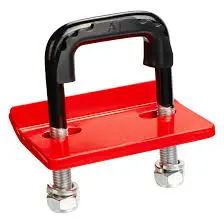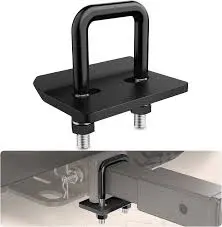Can a Trailer Hitch Tightener Be Used for Heavy-Duty Towing?
2025-02-24 11:12:17
When it comes to towing heavy loads, the safety and stability of your trailer hitch connection are paramount. Many vehicle owners wonder if a trailer hitch tightener can be effectively used for heavy-duty towing applications. This blog post delves into the world of trailer hitch tighteners, exploring their capabilities, limitations, and suitability for challenging towing scenarios. We'll examine the factors that influence towing capacity, discuss the benefits and potential drawbacks of using hitch tighteners for heavy loads, and provide insights to help you make an informed decision about your towing setup.

Understanding Trailer Hitch Tighteners and Their Function
What Is a Trailer Hitch Tightener?
A trailer hitch tightener is an essential accessory designed to enhance the connection between a trailer hitch receiver and the hitch ball mount. Its primary purpose is to eliminate any unnecessary movement, ensuring that the trailer is securely hitched to the towing vehicle. The tightener typically uses a bolt, wedge, or clamp mechanism to apply pressure, reducing play and preventing rattling. This results in a smoother, more stable towing experience, contributing to both safety and the longevity of the hitching system.
How Trailer Hitch Tighteners Work
Trailer hitch tighteners work by applying pressure to the hitch receiver and ball mount to fill in any gaps or spaces that could cause instability. The mechanism, whether it’s a bolt, wedge, or clamp, tightens and secures the components in place, preventing them from shifting during towing. This removal of slack reduces the rattling noise commonly heard when towing and improves overall driving stability. The force applied helps to maintain a firm connection between the towing vehicle and the trailer, minimizing wear and tear on the hitch components.
Types of Trailer Hitch Tighteners Available
There are several types of trailer hitch tighteners, each offering unique features to suit different needs. Wedge-style tighteners use a tapered wedge to fill gaps and secure the hitch. U-bolt clamps wrap around the hitch components and tighten for a snug fit. Threaded pin tighteners use a bolt to secure the hitch in place, while anti-rattle devices focus on minimizing noise and vibration. Integrated tightening systems combine several methods into one solution for ease of use and enhanced stability. Each type is designed for specific towing setups, providing options for various preferences.

Factors Affecting Heavy-Duty Towing Capacity
Vehicle Specifications and Limitations
The towing capacity of a vehicle depends largely on its engine power, torque, and drivetrain. A robust engine with high torque ensures that the vehicle can handle the stresses of towing heavy loads. The transmission and drivetrain must also be capable of transferring the engine’s power to the wheels efficiently, while the suspension system supports the added weight of the trailer. Additionally, the braking system must be strong enough to safely stop both the vehicle and the trailer under heavy load conditions. Always follow the manufacturer’s guidelines to avoid overloading.
Hitch Class and Weight Ratings
Trailer hitch tighteners are categorized into classes based on their weight capacity, which determines how much load they can safely tow. Class I hitches can carry up to 2,000 lbs, suitable for light-duty trailers, while Class II hitches can handle up to 3,500 lbs. Class III hitches, which are the most common for heavy-duty towing, can tow up to 8,000 lbs. Class IV and Class V hitches, with capacities ranging from 10,000 lbs to 17,000 lbs, are designed for larger trailers, ensuring safe towing of heavy cargo.
Trailer Weight and Load Distribution
In addition to vehicle specifications and hitch class, the towing capacity is also influenced by the compatibility of towing equipment and the trailer. The coupling system, such as the hitch ball, must be properly sized to match the trailer’s coupler. Additionally, the trailer's weight distribution system plays a crucial role in maintaining stability during towing. Properly distributing the weight on the trailer helps prevent sway and ensures safer handling. Choosing the right equipment tailored to both the vehicle and trailer’s needs is key to optimizing towing capacity and safety.
Evaluating Trailer Hitch Tighteners for Heavy-Duty Applications
Trailer hitch tighteners are essential for ensuring a safer and more stable towing experience, particularly when hauling heavy loads. They help reduce the movement or "play" between the hitch components, minimizing the risk of instability or swaying while towing. Additionally, they significantly reduce rattling and noise, which can be particularly disruptive during long trips. The tightener also enhances the overall stability and control of the trailer, providing a smoother ride. This contributes to less wear on hitch components and increases the longevity of your towing system.Limitations and Potential Drawbacks
Despite their advantages, trailer hitch tighteners do have certain drawbacks that need to be considered. They are not a substitute for selecting the appropriate hitch with the correct weight rating for your load. If hitch components are worn or damaged, a tightener may not compensate for these issues. Installation and removal of some models can also be challenging, requiring additional effort or tools. Moreover, there is a risk of overtightening, which could lead to premature wear or potential damage to the hitch and towing equipment, highlighting the need for careful use.
Compatibility with Different Hitch Systems
When choosing a trailer hitch tightener for heavy-duty towing, ensuring compatibility with your hitch system is crucial. Different hitch receivers come in various sizes and shapes, and tighteners must match these specifications to function properly. Additionally, the design and dimensions of the ball mount should be considered, as they affect the fit. Some tighteners may be compatible with anti-rattle features or weight distribution systems, which can enhance towing performance. It's important to consult with a towing expert or hitch manufacturer to determine the best tightener for your specific setup.
Conclusion
While trailer hitch tighteners can enhance stability and reduce movement in heavy-duty towing scenarios, they should be viewed as a complementary tool rather than a primary solution. Proper hitch selection, adherence to weight ratings, and correct load distribution remain essential for safe and effective heavy-duty towing. If you want to get more information about this product, you can contact us at info@qdkshd.com.
References
1. Smith, J. (2022). The Complete Guide to Trailer Hitch Tighteners and Heavy-Duty Towing.
2. Johnson, A. (2021). Safety Considerations for Heavy-Duty Towing Applications.
3. Brown, R. (2023). Advancements in Trailer Hitch Technology for Enhanced Stability.
4. Wilson, M. (2022). Comparing Trailer Hitch Tightener Types: Pros and Cons for Heavy Loads.
5. Davis, L. (2023). Understanding Weight Distribution and Its Impact on Towing Performance.
6. Thompson, K. (2021). Navigating Hitch Classes: Choosing the Right Setup for Your Towing Needs.
Send Inquiry
You may like
